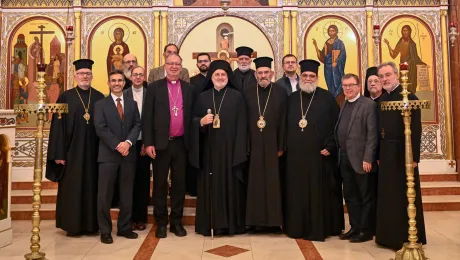In our fourth and final Bible Year webinar, two leading Lutheran theologians explore ways in which Scripture can inspire meaningful and prophetic action, but can also be misused as a weapon to oppress, discriminate and divide.

Rev. Dr Antje Jackelén from Sweden (left) and Rev. Dr Kenneth Mtata from Zimbabwe. Photos: LWF/Albin Hillert and ELCZ
Rev. Jackelén from Sweden and Rev. Mtata from Zimbabwe discuss relevance of Scriptures in final Bible Year webinar
(LWI) - How can the Bible inspire us to live better and more active Christian lives? What can it teach us about peacemaking and healing the deep divisions in our churches and societies? And how can we be more effective in communicating the liberating message of Scripture to increasingly secular and often skeptical contemporary audiences?
Those were the questions at the heart of the fourth and final webinar of the Bible Year series, organized by the Lutheran World Federation (LWF) to celebrate the 500th anniversary of Martin Luther’s landmark New Testament translation, which made the good news of the gospel widely available to lay people in his native Germany.
Two leading Lutheran theologians, Rev. Dr Antje Jackelén from Sweden and Rev. Dr Kenneth Mtata from Zimbabwe, reflected on ways in which the Bible can inspire meaningful and prophetic actions, but can also be used as a weapon to oppress, discriminate and foment deep divisions between people. Scripture can be misused as “a quarry where you can pick up the stones to throw at others,” warned the former archbishop of the Church of Sweden.
Fresh perspectives on biblical narratives
Speaking from her Nordic context, Rev. Jackelén noted that biblical texts can be found in much of our everyday language, art and culture, yet these reference points are increasingly unknown by people with no faith or religious education. This widespread decline in knowledge of the church in many European countries presents both challenges and opportunities, she said.
While traditional preaching and bible study groups are central to sharing the message of the gospels, she said there are many innovative ways of introducing Bible stories to people who are increasingly searching for a sense of meaning in their lives. Books, podcasts, social media, or seasonal activities at Christmas and Easter can offer opportunities to provide fresh perspectives on biblical narratives and make people curious to find out more about the Christian faith, she added.
Jesus’ words in Matthew 25 “are vital for framing the church’s message about feeding the hungry and welcoming the stranger.”
– Rev. Dr Antje Jackelén, LWF Vice President for the Nordic region
Rev. Jackelén, who serves as LWF Vice President for the Nordic region, also spoke about the prophetic tradition of the church in combating injustice and critiquing the abuse of power. While people may criticize the church for becoming involved in politics, she said, both the Old Testament prophets and Jesus’ words in Matthew 25 about feeding the hungry and welcoming the stranger “are vital for framing the church’s message” and its engagement in social justice issues. “As Lutherans, we have learned that justice and justification must be held together,” she stressed.
Reflecting on the need to heal the polarizing divisions, both in churches and in society, Rev. Dr Jackelén noted that “the closer things are to our hearts, the more unforgiving, the more anxious we can become.” The church, she insisted, “is tasked with exploring controversies [….] and fostering healthy responses to conflict where we can trust and listen to each other.” Jesus “loved to ask questions,” she said, yet “we often feel tempted to give answers” rather than admitting our need to listen and learn from others.”
Promoting peace with justice
World Council of Churches’ program director for Public Witness and Diaconia, Rev. Dr Kenneth Mtata, shared perspectives on the way “our encounter with the Bible is always mediated through hermeneutical or cultural lenses.” Speaking about the misuse of Scripture, he recalled the way that Bible verses were used to justify apartheid, referring to “southern Africa as a promised land for White people.” However committed we may be to a particular point of view, he continued, we must be aware of the need for a “hermeneutic of love” so that we do not hurt others and our passion does not become a form of idolatry.
Reflecting on the relevance of the Bible for contemporary challenges of peacemaking and reconciliation, Mtata, a former General Secretary of the Zimbabwe Council of Churches, said both the Old and New Testaments contain many references to peace and the Hebrew concept of ‘shalom’. Although he noted “it is often harder to mobilize people around justice than around peacemaking,” he stressed that the two must go together, otherwise it is “cheap peace.”
Speaking of the 1983 to 1987 genocide in his country, when at least 20.000 people were killed by government forces, Rev. Mtata said “the church can contribute to the conversation” about amnesty and reconciliation, “listening to the pain of the victims and the fears of the perpetrators.” The biblical narrative of the feuding brothers Jacob and Esau is relevant, he said, because “it shows that reconciliation is possible.”
Finally, the Zimbabwean theologian underlined the importance of ecumenism in the work of biblical translation and promoting the gospel to counter “fears of difference and diversity.” Scriptures themselves, he said, “affirm diversity within the economy of God’s creation” as the many different groups present for the birth of the church at Pentecost make clear. “Within the dynamism of the ecumenical family,” Mtata concluded, “dry bones can be revived [….] and we can hear God’s word in new and fresh ways.”
The four-part Bible Year series of webinars was coordinated and hosted by Rev. Szabolcs Nagy from the Evangelical Lutheran Theological University in Budapest.


